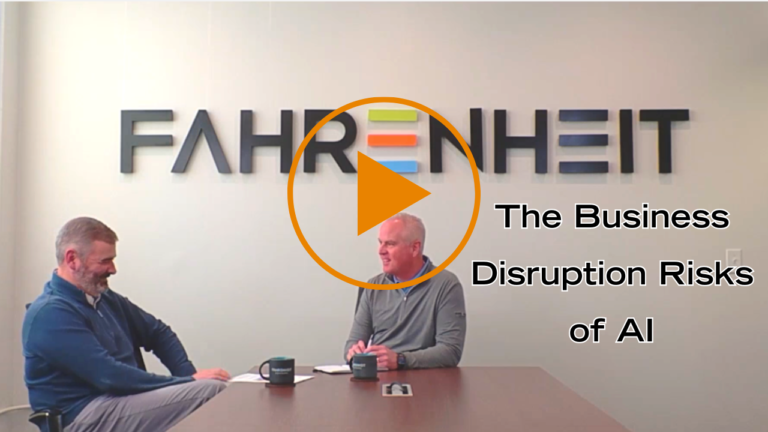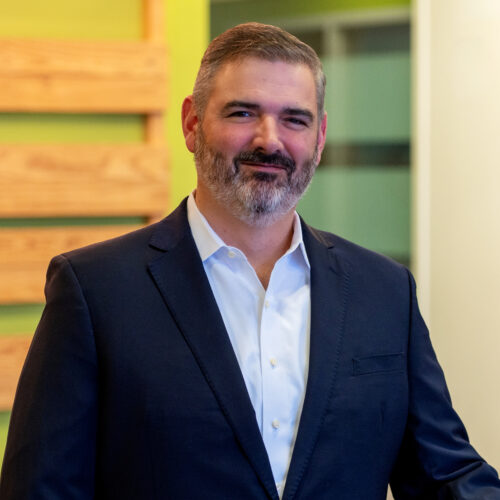The Business Disruption Risks of AI

Artificial Intelligence (AI) is a rapidly growing business disruptor that will affect every company’s culture and operations. This Harvard Business Review article illustrates six scenarios of potential disruption and corresponding opportunities. Our business disruption experts, Peter Grimm and Rich Reinecke discuss the potential disruptors presented and the opportunities they could present in this five minute video.
6 Potential Disruptors & opportunities
1.) Gains Through Granularity – What if you could manage every KPI perfectly? Access to precise data could leapfrog you past your competitor. But if your competitor has adopted this technology ahead of you, they gain that competitive advantage.
2.) A Reshaped Partner Ecosystem – The need to form partnerships to access technology causes vulnerability.
3.) Snowballing Risk and Expensive Regulatory Regimes – AI requires constant monitoring and a culture of flexibility.
4.) Radical Cost Transformation from AI may positively affect your bottom line.
5.) Value Proposition Redefinition – Stay ahead of AI effects by redefining your value proposition with your customers and potential customers.
6.) Obsolescence – Plan on continually revisiting your business framework to adapt and maintain flexibility.
Source: Harvard Business Review
Video Transcript
Rich: So, I think what we’re experiencing here at Fahrenheit is the extreme change that every business is feeling with AI.
Peter: For sure. There’s a great article recently, in the Harvard Business Review by a guy named David Edelman and Vivek Sharma, called Six Ways That AI Can Disrupt Your Business and they go through from a board perspective and talk about different ways that boards should be thinking about AI and the different impacts that it could have on any given business. So, they give you a framework to think through potential impacts. And then they walk through the six, which is cool. Really, well structured.
So the first one they talk about is gains through granularity. So, if you were to imagine a world where you could manage every KPI perfectly and you’re not using averages, you’re not using imperfect data, but you have a machine to manage that optimally across all the KPIs. What does that world look like. What would it look like if you had a competitor who could do that but you couldn’t? So, gains through that granularity of data and the ability to more precisely pull the levers of the machine.
The second one they talk about is the partner ecosystem. I think this has implications for just about everybody out there. But they talk about the automotive industry.
And if you think about how AI is coming into autonomous vehicles and all the different sensors and inputs, it’s becoming more of a computer than it is a vehicle. Well, their point in this article is that. That’s making the OEMs, the Fords and GMs of the world pretty heavily reliant on those tech partners in more ways than just supply chain.
There are all sorts of liability questions. There’s real complexity in that partner ecosystem. The sort of build, borrow, buy conversations get very complicated very quickly. In that new ecosystem. Because you have specialists in this, in AI. Where I’m not a specialist.
I don’t think you’re a specialist. I’m absolutely not a specialist. But there are people out there and if we’re going to go do something in this space, you and I, we’d probably partner with one. Absolutely. So, it creates a lot of complexity.
The next one they talk about is just snowballing risk and the regulatory implications of this.
So, they point out that as we learn more about AI and what it’s capable of, what it’s good at, what it’s maybe not so great at. We’re likely to see this risk profile grow. And so how do you deal with that? How do you think about that and be flexible to adapt to it as it grows?
The last three of the scary ones, and they’re my favorites, honestly, because it’s what I deal with and talking about disruption with my clients. And those are real fundamental changes to the business.
So radical cost transformation. Certain things will not cost what they used to cost, and they use they use management consulting as an example of that. The traditional leverage model consulting firm, where your business is billing out 24 year old MBAs. There’s a lot of stuff now that you don’t need those 24 year old’s. Right.
And they have some really interesting stats about how much more productive they are how much cheaper it is. That’s all revenue for them. So how do you think about that? And there’s implications across a lot of businesses around cost transformation.
The next one is value proposition redefinition. So, fundamentally shifting how you create value for your customers. Or finding that somebody else has shifted that paradigm for you. Thinking about how you get ahead of that. How could you see it coming?
The last one is flat out obsolescence. There are going to be things that just aren’t needed. Really good framework though for boards for business leaders, CEOs, leadership teams to just a framework of how to wrap your head around it.
Rich: It’s sort of amazing the pace of this change.
Peter: AI is rapidly growing and they make that point in here as a matter of fact, it’s not like you can have a tiger team or strategy team or even an outside consultant say, come study this for 6 months.
Tell us what to do. It’s changing too quick so they would encourage you to develop a framework to think about it in real time because it’s happening so quickly.
Rich: The one thing I think businesses can’t do is ignore that this is here, right? You have to take action now or suffer the consequence of the world moving beyond you.
Peter: It’s going to be a real step change in a lot of industries. A lot of traditional businesses are not going to look the same. You have an opportunity to get out in front of that or get left behind.
Rich: You’re an expert on disruption.
This is this is where your brain lives. So, if folks are interested in better understanding these concepts, they should just reach out to you.
Peter: I’d be glad to talk with them. I’ve been looking at disruption for a long time, and since I started doing this 15 years ago. I used to say the pace of change was fast.
Then it is off the charts now, right? You really can’t afford not to be thinking about this. This article is a great place to start. If you just have a couple minutes and want to kind of wrap your head into it. If you want to take a little bit more time and kind of dig into some of the frameworks and understand some of the potential implications for your business, we can do that in half a day or a day session.
HOW WE HELP ORGANIZATIONS ANTICIPATE, PREPARE FOR & CAPITALIZE ON DISRUPTIVE CHANGE
Disruption Experts
 Peter Grimm leverages his background in national security and experience as a strategy consultant and PE-backed CEO to help clients navigate rapidly changing environments. He is skilled in corporate strategy, market analysis, competitive intelligence, disruption planning, disruption preparedness, and organizational leadership.
Peter Grimm leverages his background in national security and experience as a strategy consultant and PE-backed CEO to help clients navigate rapidly changing environments. He is skilled in corporate strategy, market analysis, competitive intelligence, disruption planning, disruption preparedness, and organizational leadership.
 Rich Reinecke is co-managing partner and co-founder of Fahrenheit Advisors. A recruiting industry veteran with a unique blend of large corporate experience and a dynamic entrepreneurial spirit, Rich plays a key role in developing Fahrenheit’s culture and brand. He also leads key community and client development efforts, the firm’s internal talent acquisition efforts, and the firm’s executive search practice. With more than 20 years of recruiting industry and entrepreneurial experience, Rich’s expertise gives Fahrenheit the ability to leverage relationships to help our team and our clients accomplish their goals. He is a member of Fahrenheit’s Leadership Team.
Rich Reinecke is co-managing partner and co-founder of Fahrenheit Advisors. A recruiting industry veteran with a unique blend of large corporate experience and a dynamic entrepreneurial spirit, Rich plays a key role in developing Fahrenheit’s culture and brand. He also leads key community and client development efforts, the firm’s internal talent acquisition efforts, and the firm’s executive search practice. With more than 20 years of recruiting industry and entrepreneurial experience, Rich’s expertise gives Fahrenheit the ability to leverage relationships to help our team and our clients accomplish their goals. He is a member of Fahrenheit’s Leadership Team.


